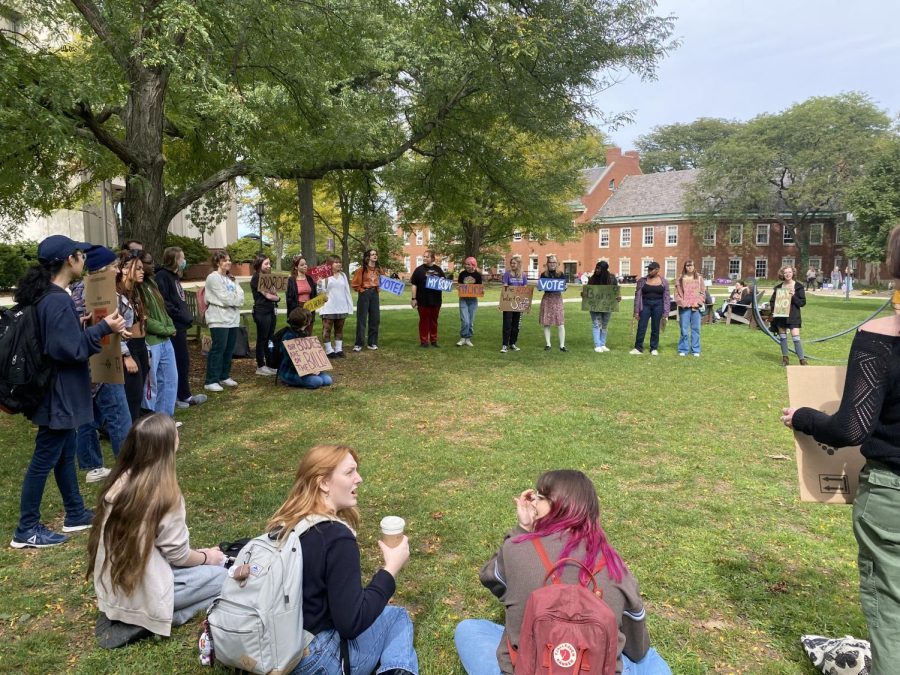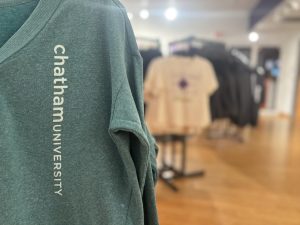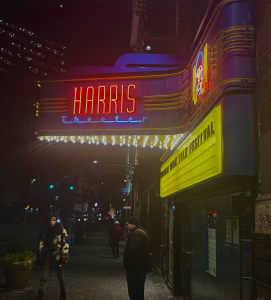Guest Voices: A Day Without Us march is a poor example of activism
Guest Voices is an occasional series that invites students to share their views about a topic of importance and interest to them on campus.
October 17, 2022
Chatham Queer Student Alliance
On Friday, Sept. 30, there was a student-led and organized walk-out and protest on the Quad at the Shadyside Campus in response to the Supreme Court of the United States’ ruling to overturn Roe v. Wade.
Many Chatham students attended and walked around campus chanting with homemade signs, letting their anger and frustration at this decision be known.
We hesitate to call it a successful protest. It is safe to say that intersectionality, careful thought and proper planning were not at the forefront of the organization process.
Beginning with the basics of organizing a protest or rally: the location matters. We raise the question: why protest on Chatham’s campus?
President David Finegold sent out an email after Roe v. Wade was overturned in which he stressed that the community would be coming together to champion women’s rights and health.
In his email, he did not state that he is in support of the overturn, so who, exactly, was being protested on campus? Why organize it on a campus that encourages support of the community being targeted?
In company with this, whether intentional or not, the signs and chants fed into the very thing the protest was attempting to condemn. Signs with images of ovaries and uteri boil individuals down to being nothing but their reproductive organs and give into the transphobic narrative that a uterus equals a woman.
If one is within the conversation surrounding Roe v. Wade, they know that this is the opposite message the movement intends to convey. Core values of the movement are meant to convey that people are not defined by their bodies, nor their reproductive abilities.
What about the women without uteri that this affects? Under Roe v. Wade, aspects of healthcare were protected, like access to safe and regulated hormone replacement therapy. Not just transgender women, but cisgender women who’ve had a hysterectomy will no longer have access to proper healthcare for the upkeep of hormone regulation.
This type of accidental underlying message is exclusionary to the large groups of people impacted by the decision, including but not limited to transgender individuals.
Transgender individuals need access to safe contraceptives and abortions. If someone is undergoing hormone replacement therapy using testosterone and has an accidental pregnancy, that can be a severely life-threatening situation now that access to abortion has been revoked in multiple states.
Along with this, transgender individuals undergoing hormone replacement therapy by using estrogen are already having an even more difficult time gaining access to the necessary resources to help them along their transition process.
The people who are put in dangerous situations as a result of the overturn are not, and will not be, isolated to only cisgender women.
Compare this to the Be Our Voice! Protest in Downtown the day after Chatham’s protest. This was in support of the Iranian people, specifically to protest against the murder of Mahsa Amini by the Iranian regime.
What needs to be considered is that one was public and one was not. The rally and protest for Mahsa Amini was held in front of the City-County Building, a government building, with the general public having knowledge and access to the protest.
Because of this, it caught the media’s attention, adding to the overarching message that United States citizens across the nation, and people across the globe, stand in support of the Iranian people and against the regime.
Chatham’s Day Without Us protest was held on a secluded campus that only the Chatham community had access to. The community here already holds a majority progressive population.
There was no one of power to protest within our community and no one outside of our community knew about it. There has been no media commentary about the protest outside of Chatham’s campus.
Due to this, the whole protest came across as if it was done for the organizers and participating students, and them only. It did not hold any real push toward change, making it a prime example of performative activism.
We also raise the question of why the organizers were given a proclamation from Chatham’s Student Government. Protests, when done correctly, are a necessary part of progressing society.
If someone who organizes a protest only does it with the intention of being rewarded or praised, then they are not organizing it for the right reasons.
That said, we believe that the protest was held in good faith and that the organizers and Chatham Student Government simply made a mistake. However, that does not dismiss the negative impact it had.
If the goal was to educate students on campus, there are ways to do so that are not harmful or performative. We hope the protesters read this piece and find tools to grow, learn and keep pursuing justice with the same passion they exhibited on campus that day.







